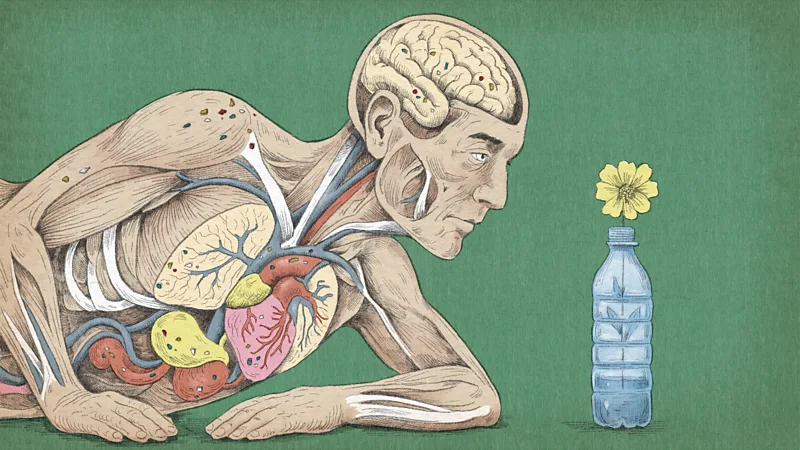The recipe for a Christmas number one - and how the secret to success has changed
Christmas number one isn't just a coveted slot for artists - it can also tell us about the mood of the nation and our evolving taste in music.

LadBaby dominated the 2020s with five consecutive hits characterised by energetic, danceable, and novelty tunes designed for virality.
The string of hits - including 2019's I Love Sausage Rolls and 2021's Sausage Rolls For Everyone - solidified this decade as the most upbeat era for Christmas number ones.
That's according to Spotify data, which ranks danceability and other features including a song's happiness or sadness - known as valence - from zero to one.
It also categorises songs by their "speechiness" - the 2000s were the speechiest decade - and "acousticness" (the 1950s were particularly acoustic).
Wham!'s classic Last Christmas - which turns 40 this year - hit number one last year. The song has a danceability score of 0.7 - 0.2 points above the 0.5 average - continuing the recent trend of high-energy hits.
The energetic hits of the 2020s are a departure from previous decades when the Christmas top spot was defined by slower, sadder, and more reflective songs.
The 2000s and 2010s leaned heavily on emotional ballads, thanks in part to a string of X Factor winners.
Their songs include Alexandra Burke's Hallelujah in 2008, which by Spotify's metrics is the saddest Christmas number one on record.
Looking back further, Stay Another Day by East 17, which marked its thirtieth anniversary this year by helping to raise funds for music therapy charity Nordoff and Robbins, is another poignant classic.
"It's a very reflective time of the year, and I think that might have helped with the song because it is a time of reflection and looking back over the year. So, I think it fits well with Christmas," said East 17's Tony Mortimer.
The sixties was the happiest decade on average for Christmas number ones, according to Spotify's valance scores.
Elvis Presley's Return to Sender, which topped the charts in 1962, ranks as one of the highest-scoring tracks for happiness - despite being about a break-up.
But the happiest-ever Christmas number one was Dave Edmunds' I Hear You Knocking, which claimed the top spot in 1970.
Christmas number ones and the mood of the nation
Why has the mood of Christmas number ones changed over the years? Part of the answer lies in the decline of X Factor's influence after dominating the 2000s and 2010s.
Another interesting factor could be the relationship between music and the economy.
While it's difficult to definitively link economic conditions to musical trends, times of hardship have often coincided with more sombre Christmas hits.
For instance, Alexandra Burke's Hallelujah became the saddest Christmas number one during the 2008 financial crash.
"It's honing in on what is going on around the world and bringing people together with the music and with the songs," said Laura O'Connell, senior pianist at the piano bar Piano Works.
"I think music does wonders and makes people feel more connected to what's going on around the world."
But LadBaby's upbeat, danceable hits have found fans in challenging times including the COVID pandemic and cost of living crisis, driven by their social media virality and tapping into a festive spirit of generosity.
With all proceeds going to The Trussell Trust, their songs blend catchy, fun music with a sense of community and purpose.
Other charity singles that have reached Christmas number one include The Justice Collective's rendition of He Ain't Heavy, He's My Brother, which raised funds for charities linked to the Hillsborough disaster, and the Lewisham and Greenwich NHS Choir's A Bridge Over You, with proceeds benefiting various healthcare charities.
Longevity and legacy
While the novelty nature of LadBaby's hits means they often fade quickly from the charts, other Christmas number ones have demonstrated remarkable staying power and enduring success.
"Music's always changing, and things become popular here and there and some really stick around and get requested a lot and some not so much," said O'Connell, reflecting on the songs most often requested for her to play at Christmas.
"But with Christmas it's always recurring, the same sort of hits come up and the nostalgia comes in."
Whitney Houston's I Will Always Love You and Queen's Bohemian Rhapsody hold the record for the longest consecutive runs at the top of the charts as Christmas number ones, with 10 and nine weeks at number one respectively.
Queen's iconic anthem is also unique for being the only song to reach the Christmas top spot twice with the same version, in 1975 and 1991.
Band Aid's Do They Know It's Christmas, which also turns 40 this year, is aiming to claim the Christmas number one spot for a third time. They have released a different version of the song each time.
How well do you know your Christmas number ones?
Think you can tell your festive classics from chart-topping surprises? Put your knowledge to the test with our Christmas number ones quiz!
-SKY NEWS







